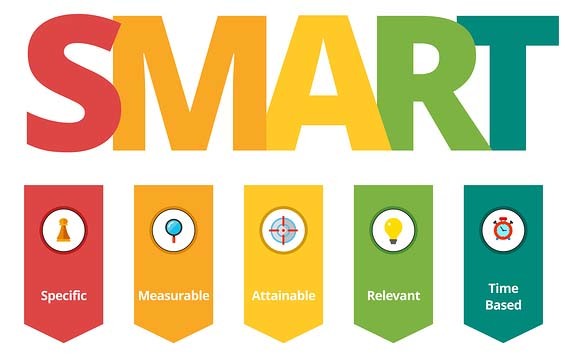As a business, you need to set goals to be successful. Without them, you have no purpose to strive for. This will cause your business to grow stagnant. In this way, you can think of your goals as stepping stones.
What goals are
A goal is either a short or a long-term step towards the desired result. They provide you with a clear understanding of what your business is striving to accomplish. Chron says you can think of your short-term goals as steps towards accomplishing your long-term goals – a way to help you stay on track. They offer clarity and meaning for all your decisions.
Goals are different from wishes. A wish is merely a statement (e.g. “My company will make money this quarter”). You can easily turn your statements into goals though. To do this you’ll need to follow proven goal-setting procedures.
What SMART goals are

When you’re ready to turn your statements into goals, you’ll want to create what’s known as “SMART goals.” Insightly says these are goals that are specific, measurable, achievable, realistic and time-relevant. The best way to explain this is to take a closer look at each point in regard to G suite CRM integration. Here is what you’ll find:
- Being specific means knowing how you’ll use this tool to better your business. Although you’re probably aware of its benefits, you’ll still want to hone in on the specifics, which means asking: What data points will you input? When will you input them? Who will input them? Where will you store the data? With these clear answers, you can then specify your goals with the new CRM.
- Make sure that the goals you set are measurable by cold hard facts. This gives you accountability you don’t lose focus. Some of the easiest things to measure with your CRM include the value of incoming opportunities, the value of opportunities you’ve won and lost, how many leads were won at each stage of your pipeline, and the percentage of sales in each category.
- You want to also make sure that your end goals, along with each step you take towards them, are achievable. This helps you and your team feel like forming new habits to reach your goals is doable. As such, you’ll want to take time to outline specific actions that are easy enough for your everyone to do each day until you’re successful. For instance, you may set a goal of reviewing reports as a team weekly as this will help everyone learn the system and track progress toward the end goal.
- Although you should set challenging goals, they should also be realistic. Don’t yourself up for failure by setting your sights too high. Doing so discourages everyone from the beginning. Realistic goals are seen as having potential. This makes people work harder to succeed.
- While you want to give yourself enough time to make changes, you also want to offer enough of a challenge to make your team stretch and grow. This is why you should think in terms of months, not weeks.
The Australian Government says a good example of a SMART goal is the desire to grow your gardening business. With this in mind, here’s what your SMART goal would look like:
- Specific: I’ll gain four new clients.
- Measurable: I’ll keep track of how many new clients I gain while maintaining my current client base.
- Achievable: I have four available spaces in my schedule.
- Relevant: Adding clients will allow me to grow my business and increase my income.
- Timely: I’ll accomplish this within three months.
How to set SMART goals

Now that you know what a SMART goal is, Mind Tools says there are 5 golden rules you should remember when establishing them. These include:
- Only set goals that actually motivate you. This means only choosing goals that are important to you and that offer you value once you’ve achieved them. When you don’t have much interest in their outcome or they’re irrelevant to your larger picture, you probably won’t work to make them happen because you won’t be motivated to do so. To make sure your goal is motivating, write down why it’s valuable.
- Always write your goals down. This physical activity makes your goals seem more realistic and tangible. You also don’t have an excuse for forgetting about them. As you write, use actionable words (e.g. will, I’m going to), remain positive, and always keep these goals at the top of your “to-do list.” By doing these things and always keeping your goals in front of you (on your wall, desk, computer monitor, bathroom mirror, refrigerator) you’ll have a constant reminder of what you’re working towards.
- Create an action plan. Don’t get so caught up in the outcome that you forget to write down what you’re going to do to get there. Having a list of steps you can cross off along the way is great motivation which is especially important when you have big, demanding, or long-term goals. Notre Dame Online says it’s also a good idea to publicize your goals. Whether this means sharing with a team or an individual, you’ll find the accountability is very motivating because you’re telling them why you’ve bought into this goal, thus firmly planting it within your own mind as well. They also state that it’s a good idea to set a deadline so you’re fully committed to your goal.
- Stick to your goals and see them through. You’ll know you’ve been successful in doing this if you put a simple system in place to help you track and measure your goals. Once you’ve accomplished this set of goals, press on to create a new set. It’s important to see goal setting as an ongoing activity instead of a means to an end.
Once you see your goals though you’ll want to reward yourself and your team. Think about all the time, energy, determination, and drive everyone has put into reaching these goals. Make sure you take a moment to celebrate their success.


